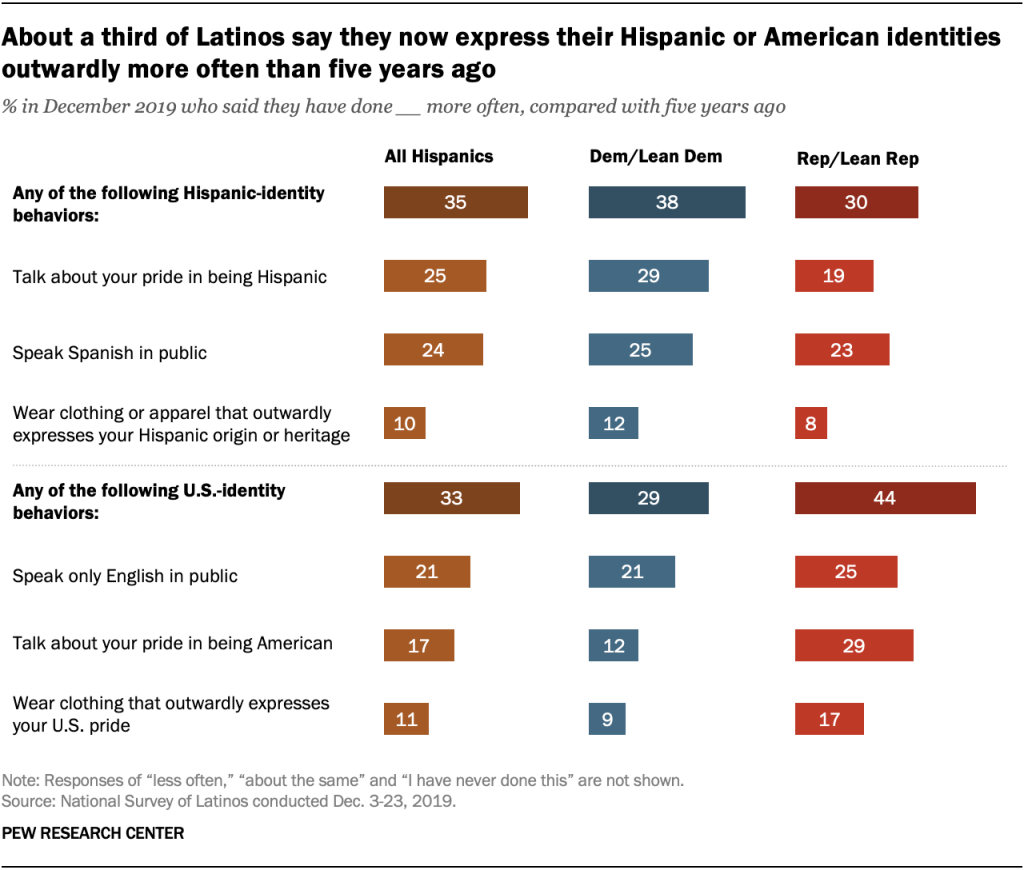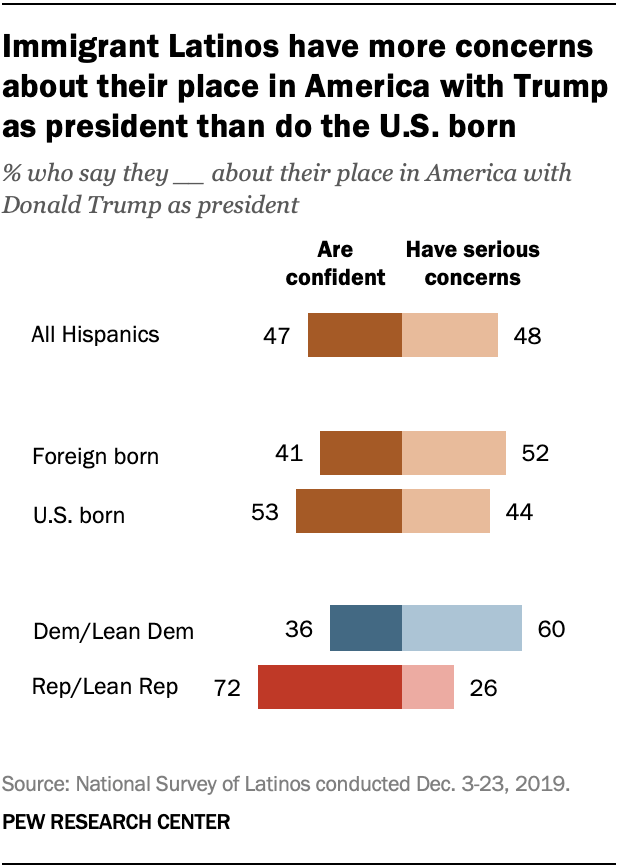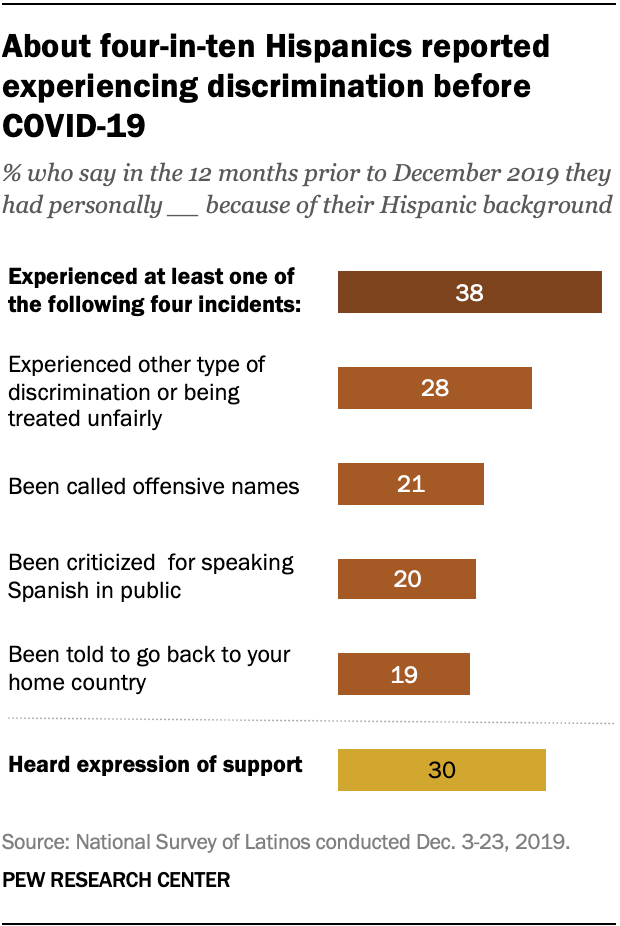Even before the United States was roiled by the coronavirus pandemic and protests over racial injustice, many Latinos had concerns about their own place in America with Donald Trump as president.
About half (48%) of Hispanics overall said they had serious concerns about their place in the country, according to a Pew Research Center survey of Latino adults fielded in December 2019. This was particularly true of Hispanic U.S. adults who identify with or lean toward the Democratic Party, 60% of whom held this view compared with 26% of Hispanics who identify as or lean Republican. Conversely, 72% of Republican Hispanics said they were confident about their place in America, compared with 36% of Democratic Hispanics.
The nation’s Latino population reached 60.6 million in 2019, accounting for about 18% of the national U.S. population. Of the nation’s 41 million Hispanic adults, roughly half are immigrants and about another 23% are the U.S.-born adult children of immigrant parents. About 62% of Latino registered voters identify with or lean toward the Democratic Party, while 34% affiliate with or lean to the Republican Party.
Pew Research Center surveys have long explored discrimination and its effects in American society. Previous reports looked at perceptions of discrimination against Black and Asian Americans, and this post explores the views of U.S. Hispanics. The survey also explored the views of Hispanics on their situation under the Trump presidency.
The findings here draw on the National Survey of Latinos. For this analysis we surveyed 3,030 U.S. Hispanic adults in December 2019. This includes 2,094 Hispanic adults who were members of Pew Research Center’s American Trends Panel (ATP), an online survey panel that is recruited through national, random sampling of residential addresses. It also includes an oversample of 936 respondents sampled from Ipsos’ KnowledgePanel, another online survey panel also recruited through national, random sampling of residential addresses.
Recruiting panelists by phone or mail ensures that nearly all U.S. adults have a chance of selection. This gives us confidence that any sample can represent the whole population (see our Methods 101 explainer on random sampling), or in this case the whole U.S. Hispanic population.
To further ensure that this survey reflects a balanced cross-section of the nation’s Hispanic adults, the data is weighted to match the U.S. Hispanic adult population by gender, nativity, Hispanic origin group, education and other categories. Read more about the ATP’s methodology.
Here are the questions used for this report, along with responses, and its methodology.
While voicing their concerns over their place in U.S. society, 38% of Hispanic adults said they had personally experienced discrimination in the previous year.
More recently, many Black and Asian Americans have reported experiencing discrimination amid the COVID-19 outbreak, while fewer Hispanics said the same, according to a Center survey conducted in June.
Shortly before the outbreak, about four-in-ten Latinos (38%) said they had experienced discrimination in the 12 months prior to the December 2019 survey, such as being criticized for speaking Spanish in public or being told to go back to their home country. At the same time, a smaller share (30%) of Latinos said someone had expressed support for them because of their Latino background.
More than a quarter (28%) of Hispanics said they had experienced another kind of discrimination or been treated unfairly due to their background. Meanwhile, about a fifth said they had been called offensive names (21%), been criticized for speaking Spanish in public (20%) or been told to go back to their home country (19%).
Still, some Hispanics said they had become more public in recent years about expressing their identities, with those who align with the Democratic Party more often showing pride in being Hispanic and Republicans more often expressing pride in being American.
Views of Trump
Overall, Latinos hold negative views of President Donald Trump, with views sharply divided along party lines, according to a separate Pew Research Center survey conducted later in June.
About two-thirds of Hispanics (69%) disapprove of the job Trump is doing as president, including 51% who disapprove very strongly. The 28% of Hispanics who approve of Trump includes 17% who approve strongly.
Views of Trump’s job performance among Latinos are tied to partisanship – 86% of Latino Democrats disapprove of Trump’s job performance, with 65% disapproving very strongly. Meanwhile, 67% of Latino Republicans approve of Trump’s job performance, including 45% who approve very strongly.
When asked in December 2019 about the effect Trump’s policies have had on Hispanics, about two-thirds of Hispanic adults (69%) said they had been harmful, with similar shares of immigrants and the U.S. born saying so. Far more Hispanic Democrats (85%) than Hispanic Republicans (38%) said Trump administration policies had been harmful to Hispanics.
One of the Trump administration’s top priorities has been to reduce the number of immigrants who enter the country. The administration has issued several orders to tighten restrictions for legal immigration and close U.S. borders amid the coronavirus outbreak.
The way Hispanics express their identity has changed during Trump years
Some Hispanics say they have changed how they outwardly show their identities over the past five years, a period that roughly starts with the launch of Trump’s presidential campaign. Before the outbreak, over a third (35%) of Hispanics said they more often outwardly express their Hispanic identity than five years ago by speaking Spanish in public (24%), talking about their pride in being Hispanic (25%) or wearing clothing that shows their Hispanic heritage (10%). Meanwhile, a similar share of Hispanics (33%) said they more often express their U.S. identity by speaking only English in public (21%), talking about their pride in being American (17%) or wearing clothing that shows their U.S. pride (11%).

Public expressions of identity differed greatly by party affiliation. About four-in-ten (44%) Hispanic Republicans said they outwardly express their U.S. pride compared with five years ago. Roughly three-in-ten (29%) of Hispanic Democrats said the same.
By contrast, 38% of Hispanic Democrats said they outwardly express their Hispanic identity more often than five years ago, compared with 30% of Hispanic Republicans.
This pattern emerges on other measures: 29% of Hispanic Republicans said they now talk more about their pride in being American, compared with 12% of Hispanic Democrats. By contrast, more Hispanic Democrats than Hispanic Republicans said they talk more about their pride in being Hispanic, 29% vs. 19%.
Similarly, Hispanics who said Trump’s policies are harmful to their group were more likely to say they have increased the outward expression of their Hispanic ethnicity (39%), compared with those who said Trump policies are helpful to Hispanics (28%). By contrast, Hispanics who said Trump policies are helpful to Hispanics were more likely to say they now express their U.S. identity more often (59%) than those who said Trump policies are harmful to the group (29%).
Foreign-born Hispanics were slightly more likely than U.S.-born Hispanics to say they have increased the outward expression of their Hispanic identity (39% vs. 32% respectively). There were no significant differences between foreign-born and U.S.-born Latinos in how they express their U.S. identity today compared with five years ago.
Note: Here are the questions used for this report, along with responses, and its methodology.



